SHTFPreparedness may collect a share of sales or other compensation from the links on this page.
Hiking can get pricy, especially when you require more gear, bigger tents, or just more storage space.
We’ve developed these thirty money-saving hiking hacks that will keep more green in your pocket.
If you’re short on time, let’s get them off and show you a thing or two about hiking the cheap way.
30 Hiking Hacks You’ll Love
1. Use Ziplocs Like Crazy

Pack toothpaste, soap, shampoo, and other toiletries in small Ziploc sandwich bags.
Keep those in a container, so you don’t have to buy all those expensive $2.00-a-piece travel-sized bottles at the drugstore.
You can snip the corners of the bags to dispense, so you’re not wasting anything. Just be sure to have them stored in a single spot so you don’t risk leakage or dripping onto other items in your backpack.
2. Repurpose Containers From Around the Kitchen
Tupperware and plastic containers containing pre-sliced deli meat are just a few examples.
Look at every container as a possible bit of storage for your hiking trip, and avoid spending far too much money on coolers, insulated bags, and storage pouches.
Many stores and guides may attempt to push unnecessary products on you; it’s advisable to ignore them.
3. Cut Old Clothes
Hiking in the middle of July? Don’t bother getting new clothes or even hitting the thrift store.
Trim down jeans, cargo pants, and other clothes to make more lightweight, breathable clothes for hiking.
If you’re a bit handy with a needle and thread, cut them with 2” of extra fabric and hem it at the bottom so they don’t take on a second-hand appearance.
If that does not bother you (as it certainly does not bother us), then cut them and continue.
4. Catch Food While Outdoors
You’re relaxing in Mother Nature’s backyard, not spending your typical nine-to-five time on a time clock.
While you’re out on your trip, kick back, set up a line in the lake, and catch all of your food.
A few wild fish can be enough to feed you for two to three days, and as an add-on bonus tip, you can cook them in tin foil to avoid bringing cookware.
5. Use Orange Peels as Mosquito Repellent

This one sounds nuts, but it works. If you’re bringing your own food, bring some oranges and keep the peels.
Rub the inside of a freshly peeled orange on your exposed skin, and you’ll deter mosquitoes for up to sixteen hours.
The only downside is that your arms will feel a bit sticky, but then again, spray-on store-bought mosquito repellent doesn’t exactly feel like lotion to begin with.
6. Borrow Gear From a Friend
Not hiking every other weekend? Especially if it’s a once-every-six-months kind of thing, you may not need to invest in your own hiking gear.
If you’re not bothering them constantly, you can hit up a friend, borrow their gear, and take care of it while you’re out.
They’ll be more likely to let you borrow it again if the mood strikes, and you’ll have spent a big, fat zero on your own gear.
7. Use Fire Starters Instead of Matches
There are a lot of tips for storing matches to keep them dry, but a fire starter takes up about 20% of the space that packed matches take and doesn’t falter when and if it gets wet.
Before they run out, fire starters typically have 3,000–5,000 strikes, and during that time, you’ll have spent far more on matches.
8. Duct Tape Replaces Repair Kits
This isn’t a permanent solution, but if you need to patch a recent hole in the tent or your sleeping bag, duct tape is actually fairly weather-resistant and insulated.
You can use one to three pieces to maintain the heat in your sleeping bag, and you can use them for a variety of purposes. It doesn’t replace repair kits forever, but it’s better than using torn gear.
9. Use Kitchen Recyclables for Kindling
Bring along condensed, empty toilet paper tubes, paper towel rolls, used paper towels, and cardboard containers that don’t contain heavy dyes.
These catches are super easy, especially if you don’t have much experience with a fire starter and are looking for a quick fire.
Just be careful that they don’t blow around, but it beats buying campfire wood at the store on your way to a national park.
10. Dehydrate Your Own Food
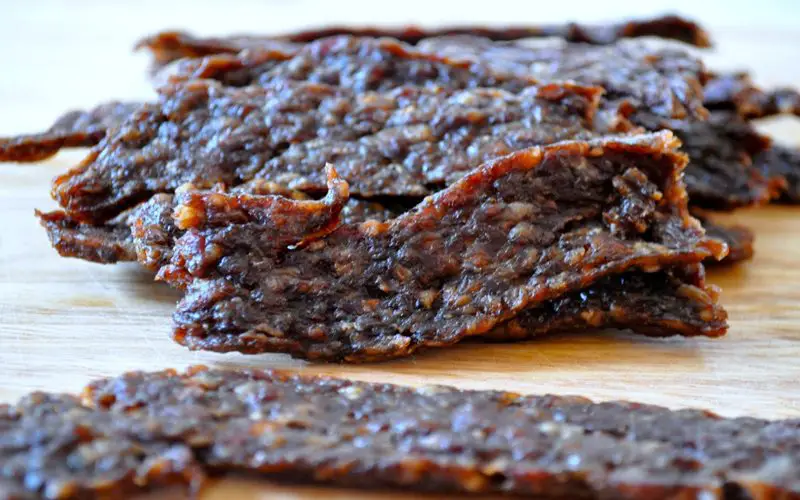
Making your own beef jerky is not only enjoyable but wildly inexpensive when you compare it to the 3.25-ounce bags that you buy in the supermarket.
When you go to buy a couple of them, you may cringe at the high price tag and reconsider your decision.
Making your own jerky also has a much lower sodium content, so you can eat more.
11. Opt for Quality Over Quantity
This is more of a long-run money-saving tip, but going with a quality sleeping bag, tent, or backpack is going to save you tons over the course of years.
If you only camp once a year, this tip isn’t particularly helpful, but if you want to camp as often as possible, quality saves money over time.
12. Buy Gear Off-Season
Outfitters and online outlets mark down gear from 10% to as low as 60% in some cases; they can’t shut down for six months, so they need to keep things moving.
You’re more likely to find these deals in a brick-and-mortar store since online shops can ship anywhere in the world, but they’re definitely out there.
13. Make a Makeshift Lantern
Get a headlamp with a stretchy band, and bring a one-gallon water jug along. Strap the headlamp so it’s facing inwards toward the jug, and turn it on.
It’s not as powerful, but for a one-man camping trip, this gives you ample light inside your tent.
14. Adopt Minimalist Mindsets
Less is more, and when you adopt the minimalist mindset for hiking you save insane amounts of money.
You spend less money, spend less time packing, and enjoy the trip far more than when you lug along unnecessary items.
15. Rural Thrift Shop Visits
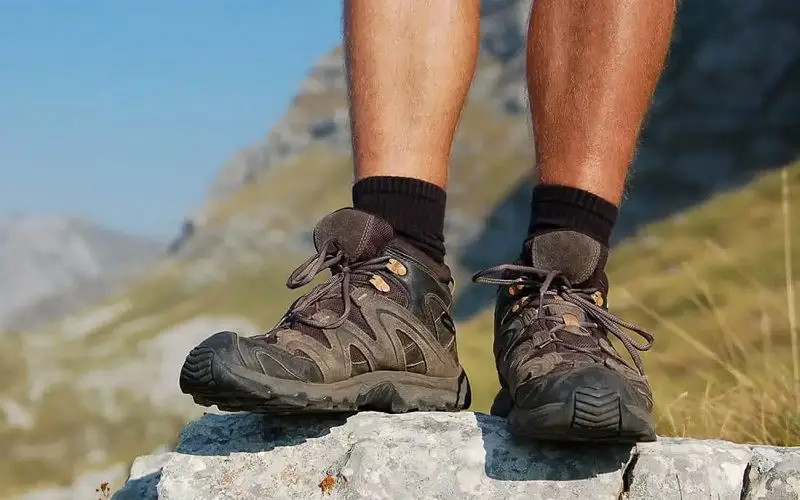
Need some high-end hiking boots?
Go to rural Goodwill locations or standalone thrift shops, and you’ll be amazed at how much outdoor gear you can find for 20% of its original sticker price.
Good hiking boots are a requirement, but spending bizarre triple-digit price tags for them is not.
16. Filtered Instead of Bottled
Bring along a gravity-fed water purification system to hang on some tree branches, and exclusively use stream and/or river water for cooking, drinking, and bathing.
A 24-pack of bottled water is insanely expensive, but you can forego this cost altogether right from the start.
17. Pack Light and Use a Smaller Backpack
If you’re buying a new backpack (or even a used one), packing lighter means you need less space and, therefore, a smaller backpack.
If you buy new, this can save you upwards of $50.00 for cheaper backpacks and hundreds for high-end brands.
18. Ditch Campgrounds and Go Dispersed Instead
Campgrounds have daily fees for staying, but dispersed camping generally requires an inexpensive permit.
You hike one to three miles from the campground trail and pitch a tent wherever you’d like, so long as you abide by the individual park dispersed camping rules and regulations.
19. Travel Locally
Nobody ever said you had to travel three hundred miles to go camping. Not to sound pretentious, but the wonderful outdoors are great no matter where you go.
If you want to enjoy Mother Nature, you can enjoy just about anything. Travel within fifty miles of your home, and you’ll save so much on gas.
20. Cook Everything in Foil
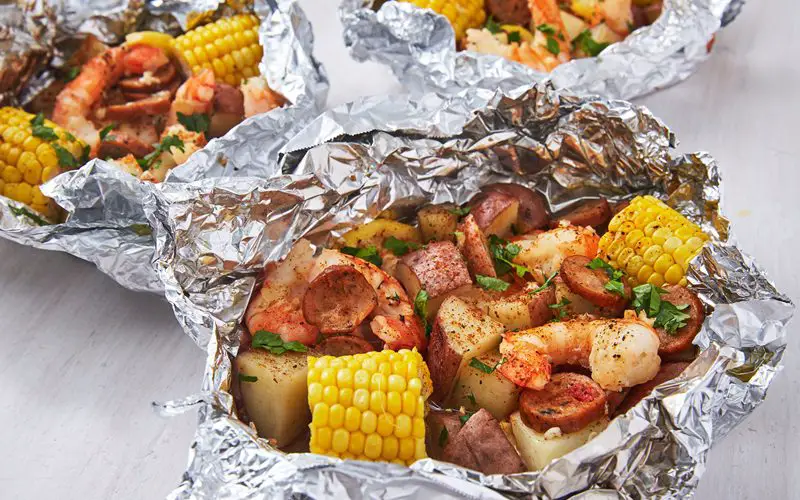
Avoid pants; they’re bulky and heavy, and your back isn’t going to thank you.
Bring along heavy-duty tin foil, and ensure it is sturdy enough to cook a wide variety of foods. Steak, potatoes, fish, and vegetables—go crazy; they’ll hold up.
21. Use Online Gas Planning Tools
Speaking of gas, if you use an online tool like GasBuddy, you can map out the best way to get gas.
You might be better off filling up near home if you’ve got a long drive ahead of you.
These tools update daily with new gas prices and even help you plan when and how often you’ll need to stop to fuel up.
22. Make an Outdoor Potty Out of a Milk Crate and Bucket
Cut a circular hole in a milk crate, pop it on a bucket, and get something to cushion the top.
You can buy cheap plastic toilet seats for about $7.00 to give you a sense of being at home, but the rest of what you’ll need is fairly inexpensive.
23. Tarps Instead of Tents
Stargazing? Are you using a sleeping pad instead of a sleeping bag?
We’re right there with you, so why not go for a pop-up tarp instead of a tent?
They’re extremely inexpensive, but more than that, they’re also super lightweight, which applies to some of our earlier tips.
24. Roll Mats Instead of Sleeping Bags
Sleeping mats and pads store easily, but they also cut down costs by 70% or more when compared to sleeping bags. The only thing to keep in mind here is insulation.
If you’re going in the middle of summer, one blanket or a heavy sweatshirt should be suitable for at night, but don’t compromise your body temperature for savings if you’re heading somewhere colder.
25. Use Campfire Light Instead of Lanterns
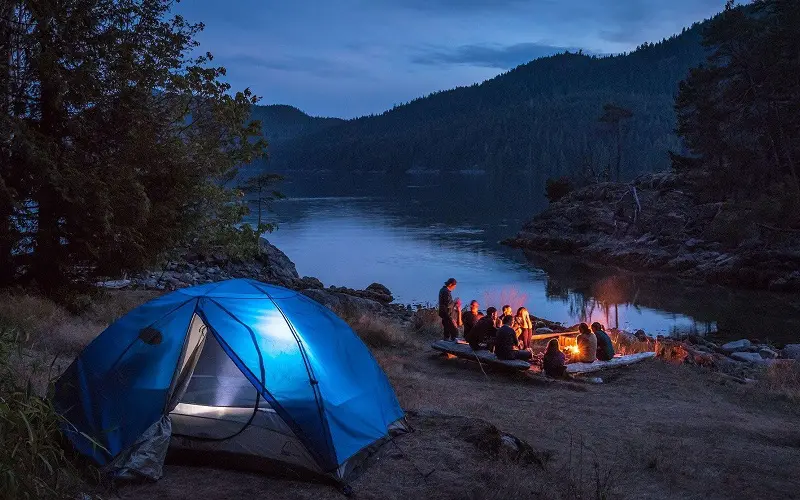
A light source is important, but if you don’t want to buy a new lantern, you can bring that makeshift one we talked about earlier and then just use the natural light of the campfire to keep the campsite illuminated at night.
There’s a slight safety concern with this, so plan ahead, and you’ll be okay.
26. Make a Makeshift Walking Stick
Instead of buying one, grab some nylon straps, find a good stick, and make your own walking stick.
We’ll admit that metal walking sticks have their benefits, such as grips on the bottom, but if you’re agile enough to go hiking, you can use a makeshift stick.
27. Bring Portable Solar Panels
We don’t have to be 100% disconnected from our devices, but our batteries won’t last forever.
You can bring power banks, or you can bring individual solar panels for charging your devices on the go.
Pop these up in direct sunlight, connect your laptop or phone, and it’ll take some time, but you’ll get a full charge generally within eight to ten hours.
28. Cook Over the Fire Instead of a Grill
Grills are heavy, expensive, and require consistent fuel (which is also pricey).
Bring a pan and cook over the campfire like in your Boy Scout days, and you’ll avoid the upkeep of a grill altogether.
Even if you decide to bring a charcoal grill, you run into a lot of stipulations with local park rangers. Nobody bats an eye at a single pan over a flame, though.
29. Batch Prep Before You Leave
Whether it’s stews, marinated meats, or veggie kebabs, prepare everything before you leave the house.
A lot of sites and publications make it sound like preparing food outdoors is glorious, but it’s actually a pain in the neck and requires you to bring additional, camping-only cutlery and cookware.
A few containers in a cooler and a single frying pan are the best way to go.
30. Bring Home Bedding
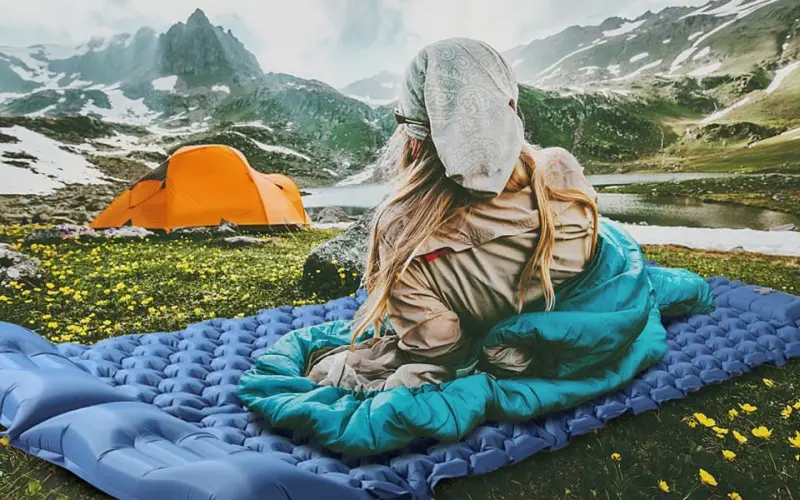
Not buying your own camping blankets?
They’re pricey; we can’t blame you, but as long as you don’t mind a thorough cleaning afterward, you can use your home bedding on your sleeping pad or sleeping bag.
For storage purposes, avoid using heavy comforters.
Wrap-Up
There you have it. We hope some of the hiking hacks on the list will come in handy on your next outdoor adventure.
After saving all that money, what will you buy?